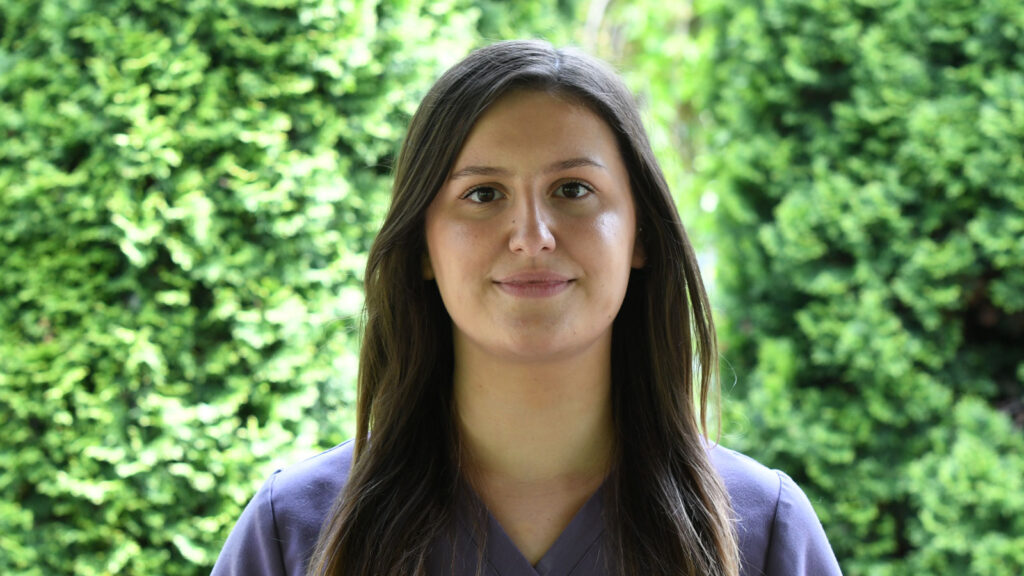ND grad and clinical programs student commencement speaker says intersections in healthcare are critical to wellness.

With the Commencement 2024 approaching on June 29, the National University of Natural Medicine is proud to highlight our speakers for the ceremony.
Tia Hernández, a Doctor of Naturopathic Medicine student graduating from the National University of Natural Medicine (NUNM) this year, knew her heart belonged to the world of medicine from a very young age.
She said she had always been fascinated by science, and when she was just 8 years old declared to her family her plans to become a doctor.
Hernández, who will be the Clinical Programs Student Speaker at NUNM’s commencement ceremony on June 29, was raised in the Midwest where the concept of naturopathic medicine was somewhat uncharted territory.
Even without an anchor to natural medicine, she said she still had a sense for the kind of doctor she wanted to be early on. Growing up, she had seen family and friends face late diagnosis, misdiagnosis, and an overall lack of treatment that left them feeling brushed off by the healthcare system time and again.
“Seeing the ways a lot of physicians and the healthcare system failed people made me even more driven to become a physician that could impact meaningful change,” Hernández said.
With the nagging feeling that improvements in healthcare were desperately needed, she forged ahead down a traditional path to pursue an MD degree.
She initially chose to study pediatrics when she landed at Purdue University for her Bachelor of Science in Pre-Medicine, but it became more difficult over time to shake her interest in other areas. Exploring coursework in reproduction such as fertility, postpartum care, hormone health and gender-affirming care, she found she had a special interest in women’s health.
Always looking for ways to expand her knowledge, Hernández took additional courses in nutrition, alternative medicine and exercise science. It was her way of becoming a more well-rounded physician, she said, but it also showed how she valued multiple perspectives.
After moving to Oregon with plans to attend medical school, she stumbled upon the opportunity to pursue a Doctor of Naturopathic Medicine degree at NUNM.
That’s when all of the pieces finally started to fall into place, she said.
“Naturopathic medicine aligned with all of my visions and ideals of what medicine should look like—holistic, individualized, patient-centered,” Hernández said. “Patients are fully individualized and their health is not limited to one body system.”
It was clear she had found her niche, at an institution that shared her belief that doctors have a larger responsibility to their patients outside maintaining the “absence of illness.”
At NUNM, she joined several student clubs to continue exploring how different fields of study overlap, and served as president of the Gynecology Club.
When it came to preparing a speech for commencement, Hernández had advice for her fellow graduates who have gone through rigorous schooling to get to where they are now. “Reconnect with the passion that drew you to medicine and revisit it regularly,” she said.
She also had a few words of wisdom for future students who might be considering a career in natural medicine.
“Many of us, including myself, entered school with a specific specialty in mind but discovered new paths and passions along the way,” she said. “Embrace every modality and field with curiosity.”
This kind of curiosity leads to a better understanding of the intersections that may exist in patient health, she said.
The future Hernández envisions, and will work toward after graduation, is one in which women’s healthcare is prioritized and gaps in data and care disappear over time.
She noted that much of the data used in medicine to treat women-bodied individuals has historically relied on research studies surveying men. Many conditions that affect women have gone underdiagnosed, undertreated, and unresearched, and can have lasting mental and physical effects, even leading to higher morbidity and mortality rates among women, she said.
Hernández eventually plans to start her own private practice after graduation, as well as engage in community work to provide better access and affordability to underserved and marginalized populations. Recently, she worked clinical shifts in partnership with Rose Haven, which offers urgent and primary care services for those experiencing abuse and other disruptive life challenges.
“My goal is to cultivate a healthcare environment where every patient feels truly understood and valued,” Hernández said, “but also spend time utilizing avenues like social media to provide information to populations that may not otherwise get it in a way that is accessible and easy to digest.”
by Ashley Villarreal, Marketing Content Specialist